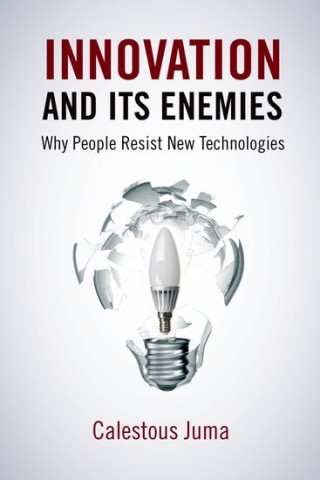Dr. Calestous Juma's new book, "Innovation and its Enemies: Why People Resist New Technologies" (2016), explains that this is a book Dr. Juma has wanted to write since his early engagement with innovation. That includes his founding of the African Centre for Technology Studies in 1988, being a former Executive Secretary of the UN Convention on Biological Diversity and co-chair of the African Union's High-level Panel on Science, Technology and Innovation and his current role of Director of the Science, Technology and Globalization Project at Harvard. He is an avid Twitter user, for anyone interested to follow his work.
For some readers, this book is bound to be cause for (critical) self-reflection. For example, Juma opens with the introduction of mobile phones – technology that has potential health risks, yet has been universally adopted and enabled additional innovations in a range of sectors, from banking and health to education and communication. He contrasts that with biotechnology and transgenetic crops, which also has potential health risks, but "has been marked by controversy that resulted in international treaties negotiated to regulate trade" (p. 2). Juma explains that the book "argues that technological controversies often arise from tensions between the need to innovate and the pressure to maintain continuity, social order and stability" (p. 5). The book is about technology and innovation, but also the socio-cultural and economic structures that enable or deter innovation, and why these exist.
The book covers a range of different technological innovations (farm mechanization, printing press, coffee, margarine, electricity, refrigeration, recorded sound, transgenetic crops, and genetically engineered salmon). The focus is not for or against, or weighing costs and benefits, of technologies, rather it is the broader context within which these innovations exist that Juma focuses upon: "Many of these debates over new technologies are framed in the context of risks to moral values, human health, and environmental safety. But behind these genuine concerns often lie deeper, but unacknowledged, socioeconomic considerations. This book demonstrates the extent to which these factors shape and influence technological controversies, which specific emphasis on the role of social institutions' (p. 6).
Juma concludes each chapter with lessons learned about each innovation, ranging from policy to regulation and politics and economics. As such, it may have appeal to a range of audiences. Consider this reflection: "Margarine represents one of the best examples of incumbent industries using legislative instruments to curtail or extinguish new technologies" (p. 117). Or, "the case of refrigeration shows that, contrary to popular belief, regulation can serve as a stimulus for innovation. In this case, many of the advances that made it possible for consumers to access safe and mechanical refrigeration resulted from regulation and new standards" (p. 198). The historical cases are less contested, as the debates have long since ended. I found the last two examples Juma presents (transgenetic crops and genetically engineered salmon) particularly interesting as they are yet to be settled. While the presentation of the issues and Juma's broader work situates his own positionality, these two chapters explore multiple sides of the on-going debates (not only the pro/con positions, but also the challenges faced by regulatory bodies and economic impacts related to export markets). On these on-going debates, Juma concludes that as "the world leader in biotechnology research, innovation and commercialization, the United States could set an example in the regulation of biotechnology innovations to ensure that society derives the highest possible benefit from these technologies in the safest possible way" (p. 277-278).
One component of the argument that Juma do not entertain in much detail is that of choice, and here an interesting analogy could also have been drawn to transgenetic crops. For those opposed to GM food crops, one of the key issues is choice, and thus advocacy for labeling to have the option to purchase GM or not. Embedded within this debate is that GM crops cannot be contained entirely, and spread (and therefore entire bans are advocated). While there are important considerations to be addressed regarding these concerns, it is interesting that mobile phone technology was not given as a parallel: one can choose not to purchase a mobile phone, but it is almost impossible to avoid exposure to electromagnetic radiation because of societal choices (the level differs, as it would with labeling options that allow for a small percentage of GM to be present in non-GM items).
The book concludes with notes on leaders and leadership: "The next frontier of leadership will focus largely on how society is prepared to respond not only to global grand challenges but also to new social problems generated by technological advancement and engineering applications. Leaders will need to be more adaptive, flexible, and open to continuous learning. They will be called upon increasingly to take decisions in the face of uncertainty and amid controversy" (p. 285-286).

